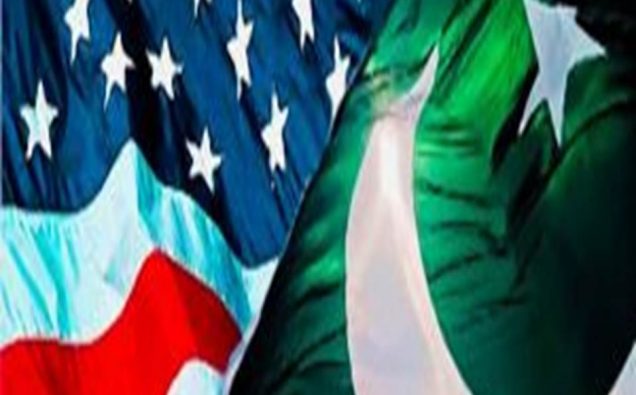
The United States and Pakistan will maintain a close bilateral relationship, officials of both countriees said a week ahead of President-elect Donald Trump’s assumes charge of the White House.
Since his November 8, 2016 election, Trump has spoken to Prime Minister Nawaz Sharif, whose government has welcomed the president-elect’s offer to help with peace efforts in South Asia, where Pakistani and Indian tensions have exacerbated over Kashmir dispute and the issue of militancy.
“If confirmed, I will work with the State Department and the Congress to incentivize Pakistan’s cooperation on issues critical to our interests and the region’s security, with a focus on Pakistan’s need to expel or neutralize externally-focused militant groups that operate within its borders,” Trump’s pick for Defense Secretary retired general James Mattis, said.
Analysts have long argued that a productive US-Pakistan relationship is key to peace, development and stability in South Asia.
Appearing for his confirmation hearing on the Capitol Hill, Mattis also specified some areas of conveegence where the two countries could mutually cooperate.
“Areas of cooperation include our support for Pakistan’s counter-terror and counterinsurgency efforts, Pakistan’s approval of U.S. logistics movements into Afghanistan through its territory and airspace, and Pakistani support for counter-piracy activities in the Arabian Sea. I also understand that the United States has conducted military exercises with Pakistan in an effort to increase trust and interoperability.”
Mattis, who has a long experience of work in the Middle Eastern region, also told thee Senate Armed Services Committee that, if confirmed, he would devote efforts to build a trusting relationship between the two countries, whose ties have seen a sea-saw pattern since their re-embrace as close allies in the aftermath of September 11, 2001 terrorist attacks on the United States.
“Our relationship with Pakistan, including our military-to-military relationship, has had highs and lows. We have long faced a lack of trust within the Pakistani military and government about our goals in the region. If confirmed, I will work to build the trust that we need for an effective partnership.”
Acknowledging Pakistan’s counterterrorism efforts, Mattis noted that for years, “Pakistan has battled internally-focused extremist organizations within its borders and with our help. In a sign of its commitment, its military has suffered significant casualties in this counterinsurgency effort.”
Answering a question, the former marine corps general said “conditioning our security assistance has a mixed history in the case of Pakistan, but I will review all options if I am confirmed, and will consult with the Committee on this question. In particular, we should be aware of any behavior that supports Pakistan-based militant groups.”
Mattis also responded to questions regarding Islamabad’s cooperation for security in Afghanistan, where the United States still maintains a substantial number of troops. Despite years of US assistance, Afghanistan still faces a spate of problems including a fierce Taliban insurgency, which Kabul says has support in Pakistan.
“I believe that states in the region have the responsibility to support the reconciliation process. From my time at U.S. Central Command, I am aware that the United States condemns any state support to the Taliban, whether it is moral or material in nature. States in the region should increase pressure on the Afghan Taliban and associated militant networks to stop their campaigns of violence in Afghanistan. Pakistan has learned some hard lessons because of its dealings with the Afghan Taliban, as violence in that country reflects, and I believe they should do more to collaborate with their neighbor. We should urge Pakistan to take further actions against the Taliban and the Haqqani Network.”
Questioned if he would agree that presence of extremist forces in Pakistan is a key factor affecting the stability and security of Afghanistan, Mattis replied:
“Sanctuary and freedom of movement for the Afghan Taliban and associated militant networks inside Pakistani territory is a key operational issue faced by the Afghan security forces. If confirmed, I will examine efforts to deny sanctuary to the extremist forces undermining the stability and security of Afghanistan.”
In Islamabad, the Foreign Ministry rejected allegations that the Taliban had militant sanctuaries on its soil and instead said the Afghan soil is being used for anti-Pakistani activities including terrorism.
Meanwhile, in Washington Pakistan’s ambassador to the United States Jalil Abbas Jilani said Islamabad looks forward to working closely with the incoming Donald Trump administration.
The diplomat told American media that the people who had been designated in the Trump administration knew Pakistan very well and there had been a better realization of the problems Islamabad was facing in the region.
“Moreover, there was a convergence of interests between the two countries on number of issues likely to strengthen the bilateral relations in future,” he added.
Jilani specifically highlighted Islamabad’s successful campaign of historical proportion, Zarb-e-Azb, to address the menace of terrorism. He expressed the hope that Pak-US cooperation would be further strengthened in the fight against terrorism by revisiting sale of F-16s and Coalition Fund issues. Ambassador Jilani said that over the last few years, the terrorist incidents in Pakistan had reduced significantly, approximately by 70% .
He contended that the emergence of extremist and violent organizations was the outcome of instability and violence all over the world.












